According to a 2024 survey commissioned by Polygon, anime is considered just as culturally significant to Gen Z as the NFL. That claim feels believable when you look at the runaway popularity of the latest Demon Slayer film, the mega-success of Netflix’s anime-inspired film, K-Pop Demon Hunters, and the strong reception to Netflix’s live-action adaptation of the long-running manga and anime, One Piece.
With Believe in the Boy Who Dreams, screenwriter Leon Chills (Shadow Force) delivers a script that dares to merge two genres: the deeply personal family drama and the limitless spectacle of anime. Chills, who has long been drawn to stories about love, legacy, and resilience, takes a bold swing here—crafting a screenplay that’s as much about healing and self-discovery as it is about dreamscapes, supernatural battles, and anime-inspired action.
The result is a script that feels both intimate and cinematic. It doesn’t just wear its anime influences proudly; it uses them as a lens to explore universal struggles of family, parenthood, and the pursuit of happiness. In an era when anime has become a global box office force, Believe in the Boy Who Dreams positions itself as both timely and timeless.
The Story
The film opens with DJ Garrett, one of our young heroes, caught in the middle of an anime-style showdown that fans of Bleach, Dragon Ball Z, and Yu Yu Hakusho will instantly recognize. DJ faces off against a nefarious trio of Obsessed Spirits: Yami, a rainbow-skinned terror; Soot, a frail monster wrapped in caution tape like its high fashion; and Nairod, a towering, intimidating brute. DJ fights valiantly, but the trio quickly overwhelms him.
As it turns out, this battle is only a dream. In the real world, DJ’s parents, Crystal and Dorian, and his sister, Zora, are once again jolted awake by another of DJ’s nightmares. Crystal, ever the nurturer, comforts her son and guides him through his Imagery Rehearsal Therapy (IRT) routines designed to soothe his restless mind.
But DJ’s recurring night terrors, and the sleeplessness they bring, have pushed the family to its breaking point. Zora feels more invisible than ever, watching as all the household’s energy revolves around her younger brother. Meanwhile, Crystal grows increasingly worried about DJ’s return to school.
Fortunately, Dorian may have an answer. A brilliant inventor, he has developed Altruistic Remedial Therapy (A.R.T.), an immersive technology that allows him to travel directly into his son’s dreams and confront his nightmares head-on. While his superiors dismiss the idea, Dorian believes it could not only help DJ, but also millions who suffer from debilitating night terrors.
When DJ falls into a coma after a heated argument between his parents, the Garrett family has no choice but to enter his subconscious using A.R.T.—embarking on a perilous journey into his anime-inspired dreamscape to bring him back.
The Characters
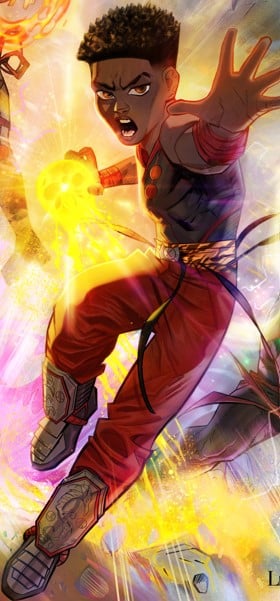
DJ Garrett
DJ is the precocious yet troubled son of the Garrett family, a sensitive kid who finds solace in Mercy Strike, his favorite anime. Although his frequent nightmares leave him feeling different and like an outsider, Mercy Strike gives him strength.
One of the script’s early comedic highlights shows DJ attempting to face down a trio of bullies using fighting techniques straight out of the anime. The result is his classmates bursting into laughter, but it’s an endearing moment that instantly makes him lovable to anyone who has ever felt different or out of place.
While the story works as an ensemble piece, DJ’s journey of self-discovery and inner strength remains at the heart of the film. Chills writes him as a lovable dork, most confident when sharing his passions for anime and baseball and a lead you can’t help but root for. It’s easy to imagine a talented young actor like Blake Cameron James (We Grown Now) or Percy Daggs IV (Never Let Go) bringing DJ’s charm and vulnerability to life.
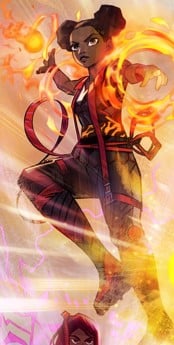
Zora Garrett
Zora is DJ’s quick-witted but perpetually overlooked older sister, who wants, and deserves, her parents’ attention just as much as her younger brother. She loves her family and is fiercely protective of DJ. Readers see this right away when she takes on three school bullies early in the script, in a scene that’s as hilarious as it is admirable.
Chills brilliantly subverts expectations by showing Zora realize—without it ever needing to be said—that her parents’ lack of attention is nothing to resent her brother for. Zora comes across as wise beyond her years, someone who notices details others might easily overlook, and a ferocious warrior both in the real world and inside her brother’s anime dreamscape.
Like DJ, her arc of realizing that she matters—and is just as important as her brother—is one that will resonate deeply, especially with overlooked or parentified older siblings. Zora is a fun, dynamic character who will likely emerge as a fan favorite when this project makes its way to the silver screen. Her sass, wit, and vulnerability immediately reminded me of Wizards of Waverly Place actress Janice LeAnn Brown, whose voice acting would embody Zora perfectly.
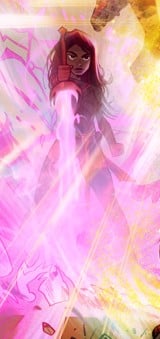
Crystal Garrett
Crystal is the loving and protective matriarch of the Garrett family. Like so many mothers, she prioritizes everyone but herself while trying to hold it all together. She desperately wants to be superwoman in the real world, a goal that’s impossible to achieve. Her inability to be everything to everyone, while neglecting her own needs, causes deep emotional and mental strain. Crystal defines herself strictly by who she is to and for her family.
In the world of Mercy Strike, however, she is challenged to think beyond her roles as wife and mother. A particularly beautiful scene shows her learning to wield her weapon, the Radiant Blade, by drawing not only on the love she feels for her family, but also from her own inner strength and identity. Her family fuels her power, yes, but it is her self-actualization, her realization of her own worth, that allows it to manifest.
When Crystal finally steps onto the battlefield, she proves to be just as fearsome a warrior as anyone else. The moment recalls the iconic Harry Potter and the Deathly Hallows sequence where Mrs. Weasley faces off against Bellatrix Lestrange: a warm, nurturing mother revealing herself to be a formidable fighter. Chills wisely gives Crystal Garrett several such moments that will have readers (and eventually viewers) fist-pumping as she kicks butt.
As far as voice actors go, one could easily imagine an actress like Jurnee Smollett (Lovecraft Country, Birds of Prey) or Teyonah Parris (WandaVision, They Cloned Tyrone) would bring both Crystal’s emotional vulnerability and her fierce warrior presence to life.
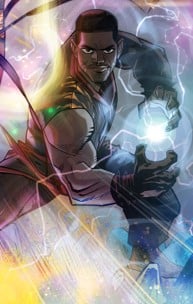
Dorian Garrett
Dorian Garrett is a welcome addition to the pantheon of positive Black father figures in fiction. At first, he seems somewhat detached regarding DJ’s struggles with sleep, but that perception is quickly upended. We learn that Dorian has developed an immersive technology known as Altruistic Remedial Therapy (A.R.T.)—a groundbreaking tool that allows doctors and therapists to literally enter the mind of someone suffering from debilitating nightmares in order to uncover solutions.
In the best sense, Dorian will remind readers of Reed Richards from The Fantastic Four: brilliant, exhausted, a little aloof, yet fiercely committed to his family’s well-being. He may not always express love in traditional ways, but his devotion runs so deep that he’ll invent an entirely new technology just to bring his son, and millions of others, peace.
The father/son dynamic anchors the back half of the script, delivering a profoundly moving exploration of love, responsibility, and vulnerability. Black male tenderness and generational trauma remain largely underexplored in film and television, which makes Dorian and DJ’s journey feel especially vital. The appearance of Grandpa Garrett, Dorian’s deceased father, in DJ’s Mercy Strike dreamworld cracks open Dorian’s carefully maintained exterior, exposing the grief, expectations, and inherited pain he has carried for years.
Although Dorian is a husband and father, he is also still a son who misses his own father. His story captures the dual weight of protecting a family while quietly questioning whether he measures up to the man who raised him. That tension culminates in an arc that is not only one of the strongest in the script but also amplifies the larger themes of Mercy Strike: that love, even when imperfectly expressed, can be transformative across generations. Love is the greatest superpower of all.
Actor David Oyelowo (See How They Run, Selma), whose vocal presence combines elegance and emotional weight, would be perfect for Dorian’s internal struggle between duty, love, and legacy. Jeffrey Wright (Highest 2 Lowest, American Fiction) whose layered and distinctive delivery gives off the impression of a man thinking ten steps ahead of everyone else, would also be a great choice.
The World of Mercy Strike
Leon Chills loves anime—there’s no doubt about it. That passion shines the moment the story steps into the world of DJ’s favorite anime, Mercy Strike. The sheer amount of worldbuilding, tropes, and clever nods to popular series will leave anime fans buzzing as they read the script (and, eventually, watch the film).
Kurayomi City is a sprawling, fictional Japanese metropolis swallowed by both literal and spiritual darkness. Its human residents coexist uneasily with sinister supernatural beings called Obsessed Spirits, once-human figures consumed by their own vices and obsessions. These spirits wear eerie masks, their still-visible human features hauntingly peeking through.
It’s a concept that’s creepy, haunting, and pure anime gold. Obsessed Spirits are people’s obsessions made real, and they are every bit as terrifying as you’d imagine. What makes them even more compelling and sets up a mystery sharp-eyed readers will want to track—is DJ’s comment to his family that many of these Obsessed Spirits are modeled after people he knows in the real world.
It’s a testament to Chills’ skill that he can weave such an essential plot point into the background, leaving readers to discover its importance only when it’s too late. If you’re paying attention, you’ll catch the breadcrumbs. And if not? Well, the twist involving the three major Obsessed Spirits the family must face is bound to make future viewers of the inevitable film sit up, snap their fingers, and exclaim: How did I miss that?
Speaking of the main villains, Chills brings them to life with chilling, layered descriptions that subtly hint at their true identities.
-
Yami is a slender, unsettling figure with iridescent, rainbow-hued skin, massive ponytails, and eyes that glow an eerie pink.
-
Soot appears frail and almost childlike, its tiny frame shrouded in floating strips of caution tape that drift around it like smoke.
-
Nairod, their leader, towers over them all—a fearsome monstrosity with an exposed brain and multiple mechanical arms that lash out to wreak havoc on its enemies.
They’re a blend of whimsical and terrifying, which is perfect for an anime world like Mercy Strike.
There’s also Hikaru Akiyama, the protagonist of Mercy Strike, who steps in as both mentor and guide. He trains the Garretts for their upcoming tournament against the Obsessed Spirits, but more importantly, he serves as a spiritual anchor, helping the family confront their inner struggles so they can unlock their true potential.
These sequences—complete with a pitch-perfect, genre-appropriate training montage—bring levity and heart to the script, offering moments that anime fans will instantly recognize and appreciate. In DJ’s mind, Hikaru is patient, kind, and wise far beyond his years, despite being a teenager.
In the hands of a lesser writer, Hikaru could have been reduced to comic relief. But Chills crafts him as a seasoned, steadfast guide who’s fully committed to helping the Garretts grow. Hikaru isn’t just fun, he’s magnetic. By the end, you can’t help but feel that he, and the richly imagined world Chills has built around him, deserves a story and spin-off all his own. Perhaps a real-life manage addition with annotations from the Garrett family?
Overall Thoughts
Believe In The Boy Who Deams is more than just a clever anime homage, it’s a story that pulses with heart, imagination, and cultural significance. Leon Chills weaves a narrative that feels both universal and deeply personal, blending thrilling anime-inspired spectacle with an honest exploration of family devotion, generational trauma, and believing in oneself and one’s family.
What could have been a simple high-concept exercise instead emerges as something layered and resonant. The Garrett family’s journey into DJ’s dreamworld isn’t just an excuse for jaw-dropping battles; it’s a metaphor for the ways we fight through pain, love, and the legacies of those who came before us. From the Obsessed Spirits to Hikaru Akiyama’s guidance, every element of the script is crafted with intention, serving the characters as much as the spectacle.
At its core, this script celebrates Black love, vulnerability, and perseverance within a genre that rarely gives space to those narratives. That’s what makes it special. It’s a story that will have anime fans cheering at its nods and worldbuilding, while also offering something richer: an emotional journey that lingers long after the final battle.
Simply put, Believe In The Boy Who Dreams has all the makings of a groundbreaking film, one that can stand proudly alongside the anime and superhero epics it draws from, while also carving out a lane entirely its own.
Don’t just take my word for it. The script will be available at www.BelieveInTheBoyWhoDreams.com on Friday, October 17th.
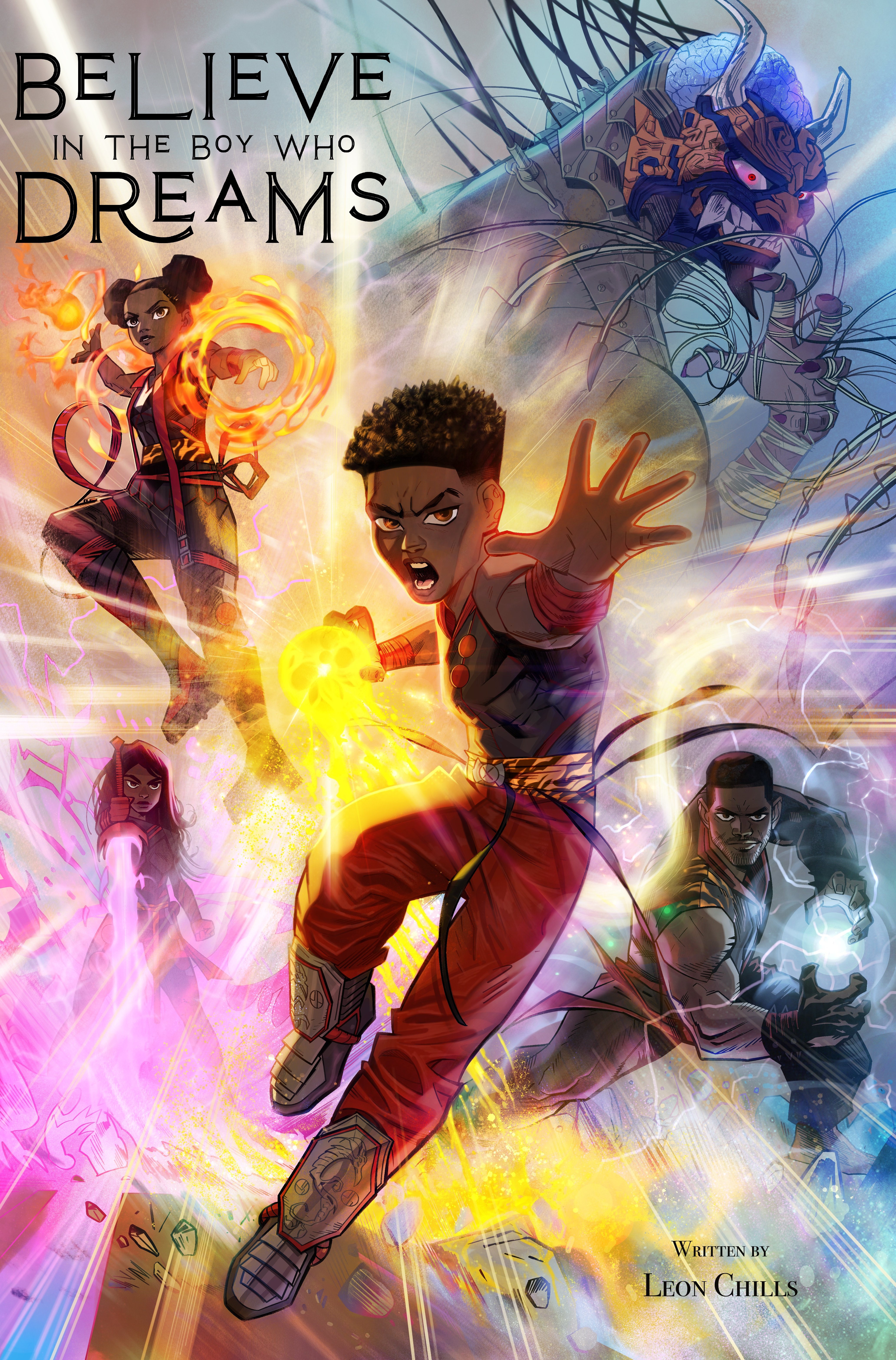
Simply put, Believe In The Boy Who Dreams has all the makings of a groundbreaking film, one that can stand proudly alongside the anime and superhero epics it draws from, while also carving out a lane entirely its own.
-
GVN Rating 8
-
User Ratings (0 Votes)
0

Writer. Video Essayist. Film/TV Critic. Pop Culture Enthusiast.
When he isn’t writing for Geek Vibes Nation or The Cinema Spot, Tristian can be found typing away at one of the novels or screenplays he’s been working on forever.


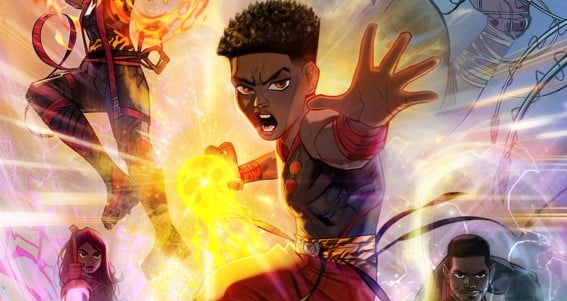




1 Comment
I usually watch every new anime episode here because english sub quality feels clean and Aniwatch loads smoothly without distractions.